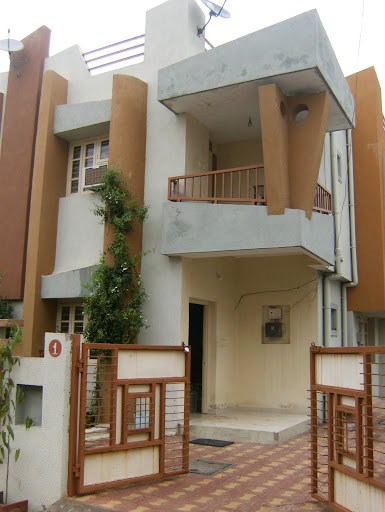As I mentioned earlier, I am interning at IBM research Delhi, working with a team there that has developed a pretty interesting technology. The premise is the following: The WWW is great, but to really leverage it you need the Internet as well as the ability to read and write (...English). But believe it or not, most people in the world don't have one or both of these things going for them (the number of illiterate people in the world is more than double the number of those online).
But what a lot more people have access to is the telecom network in the form of cellular connectivity. So while the text-based web has a lot of reach, a voice web could give access to billions more. By voice-web (the IBM team calls it 'spoken web'), I mean content accessible through a mobile phone that is audio only; instead of websites, there are VoiceSites. For example, imagine Wikipedia set up as a VoiceSite, where instead of reading about check dams, you can listen to an audio version. VoiceSites can be linked to one another, and can be navigated with a broswer using HSTP (HyperSpeech Transfer Protocol).
The IBM team I am interning with has developed this technology, and I have come in this summer to try and understand how such technology might be applied in concretely useful ways. My previous work has been in the domain of agriculture, so I started looking there. One of the things I've known for some time is that agricultural extension, the process of adapting agricultural research to local contexts through farmer education, has for some time been utilizing radio as an effective medium for information dissemination. Radio isn't the sexist technology, but it is quite well-suited for rural development: it is cheap, flexible (hardware is lightweight, portable), familiar, can be localized (through community radio), and works well in oral and non-literate communities. But a big challenge is to make radio more interactive. More generally, it has always bothered me that in social/NGO sector, rural communities are only looked at as consumers; consumers of services, products, even information. But how can they also be made producers? Many farmers I've met have a lot of useful wisdom to share, and even at the the base level social services should be getting feedback from their constituencies on whether they are delivering their services satisfactorily.
So this idea of spoken web + community radio + feedback channel developed, and we are now working on a project that tries and make this vision come to life. Specifically, I am working with an NGO in Ahmedabad called Development Support Center (DSC), which among many activities centered around promotion of natural resource management practices in Gujarat, has a weekly radio program called "Sajjata no Sang... Lave Kheti Ma Rang" (Sajjata no Sang is a network of development NGOs in Gujarat... "They bring color to the farmlands"). Our goal is to develop a model for social communication (sharing of knowledge and experiences within a community) and information access through interactive community radio. Using the spoken web technology, we will create a system for farmers to call in and leave any feedback (questions, comments, personal experiences) to DSC. Other farmers can listen to the feedback and respond as can DSC staff and/or any interested expert scientists. Conversations can build amongst farmers and with experts, experiences can be shared, and questions can be answered in a distributed manner. Additionally, we will provide an interface for the farmers to access all of the last 2 years worth of radio programming content; the information is now at their fingertips. Finally, all the feedback submitted to the system is recorded for DSC radio broadcasters to later export and play straight away on a future radio program; this sort of completes a loop where
 before, the radio program was a one-way broadcast. A more engaging experience and a greater sense of ownership develops now that the farmers hear their own voices. This sketch is something I presented early on to describe this full-circle vision.
before, the radio program was a one-way broadcast. A more engaging experience and a greater sense of ownership develops now that the farmers hear their own voices. This sketch is something I presented early on to describe this full-circle vision.As a researcher, my goal will be to design a voice-UI that is simple and user-friendly for the farmers. The spoken web system should be intuitive and navigable all through simple spoken voice prompting. We will to the furthest extent possible involve farmers themselves in the design of the interface, testing our system and incorporating their feedback early and often.
Working with DSC has been great. It is my first experience working in a formal NGO (office, 50+ staff, etc.). Every day there are mandatory chai breaks at 11am and 4pm. It is a time for the group to sit together, chit-chat, bond, etc. There is a dining area where most people eat lunch from home-brought tiffins. Sharing food is the norm. People even feel offended if their contribution was not finished by the rest of the group.

I'm living as a PG (paid guest) in a bungalow just 5 minute's walk from my office. I am staying there with one Indian guy working in Ahmedabad, and Kareem, another DSC intern. Kareem is from Canada and just graduated from college. He's here on a project dealing with participatory irrigation management and will be staying for 7 more months. He hasn't been to India, and he's a relatively timid person, so I've tried to show him the ropes. In some sense I've taken him into a mother-child relationship, making sure he's fed, getting his clothes washed, helping him get items for his room, etc. I'm a little worried about how he's going to survive, but hopefully I will have helped him get stuck in by the time I leave.
Hey, bring me back some lunch I can finish for you.
ReplyDelete- Greg